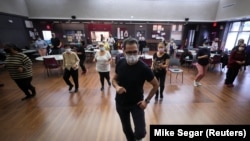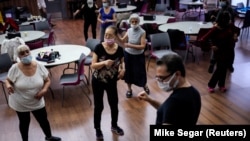The COVID-19 pandemic has been difficult on many groups of people. But perhaps it has been especially hard for many older people. Many months of being alone, or isolated, has taken its toll on many senior citizens.
However, in some places, that isolation is coming to an end.
For example, in a senior center in New York City, seniors shake their hips and stomp their feet to salsa, cha-cha, and merengue music. After two years of living in COVID-19 pandemic isolation, Latin dance classes are getting them moving together again.
Despite illness and mobility issues -- including the loss of a leg -- students are now able to take free classes at the YM & YWHA of Washington Heights and Inwood in upper Manhattan.
The dance instructor is 50-year-old Walter Perez. He and his partner, an Argentinian tango dancer, started the hour-long class in 2013. Their goal was to teach Latin social dances at senior centers.
Perez said, "We saw how our students got happier and improved their physical balance ... and they socialized.”
Perez told reporters from Reuters news agency that the classes start with seated exercises. This way everyone, even those who have trouble moving, can be included. “…And then,” he added, “we stand up and we dance a little bit.”
One of the students is Felix Castillo. Last year, his leg was amputated due to complications from diabetes. The 74-year-old trumpet player said, "I get emotional and need to dance when I hear salsa." He said he feels the music and dances in his chair.
Despite dementia, Eugenia Peralta cannot help but dance around the room. The 89-year-old is known for her energetic moves on the dance floor. For this, her fellow dancers call her “roadrunner,” said her daughter Jackie Peralta. A roadrunner is known to be a fast-moving animal.
"COVID took a toll on her. ... Her mobility went down,” said Jackie. But now, her mother is active. In fact, Jackie said her mother has a hard time staying still in one place.
Walter Perez, the instructor, said that when in-person classes started after nearly a year's break, the stamina of the senior students was not the same. He said, “...many were missing, so it was very sad. But we were happy to be here and to come back, to have this courage to keep going."
What drives Perez is the pleasure of dance. He found this relationship with dance at age 21. That was when his mother died.
"I went to the church to pray. Next to the church in Argentina there was a tango place. So, I started dancing tango, and it was therapeutic for me and then became my profession and my way of living."
He added that the music and dance have a healing, therapeutic effect on people. He likens it to an embrace. When the music is playing and you are dancing with others, “...you are not alone, you are walking with the music in an embrace."
I’m Anna Matteo.
Roselle Chen reported this story for Reuters news agency. Anna Matteo adapted it for VOA Learning English.
_________________________________________________________________
Words in This Story
take a toll – idiom to have a serious, bad effect on someone or something : to cause harm or damage
senior – n. a person older than another
stomp – v. to walk heavily or noisily
mobility – n. the quality or state of being mobile or movable
amputate – v. to remove by or as if by cutting
dementia – n. a usually progressive condition (as Alzheimer's disease) marked by the development of multiple cognitive deficits (as memory impairment, aphasia, and inability to plan and initiate complex behavior)
stamina – n. the ability or strength to keep doing something for a long time
courage – n. mental or moral strength to venture, persevere, and withstand danger, fear, or difficulty
therapeutic – n. having a beneficial effect on the body or mind
embrace – v. to hold in the arms






